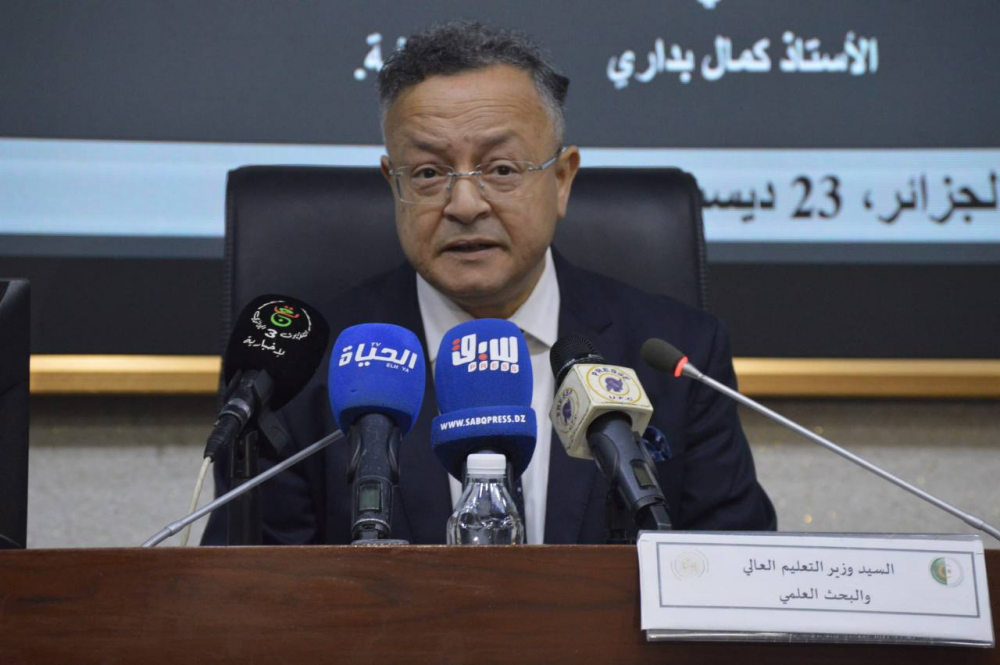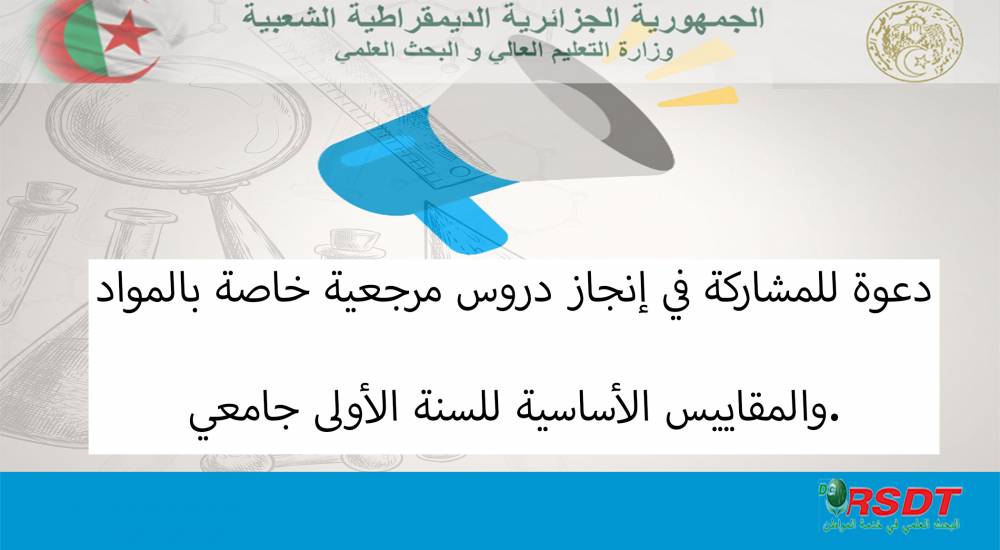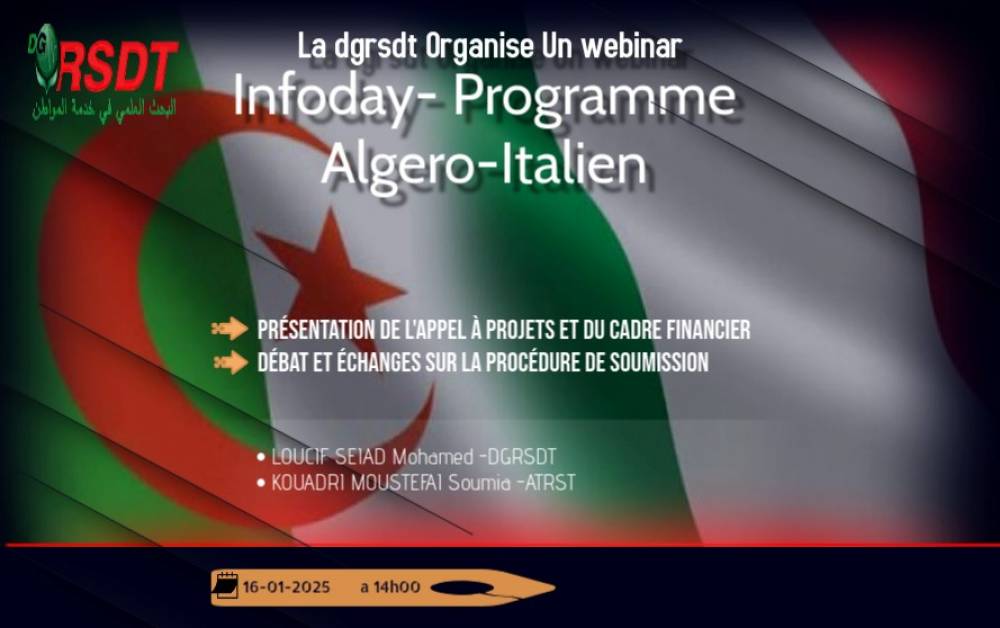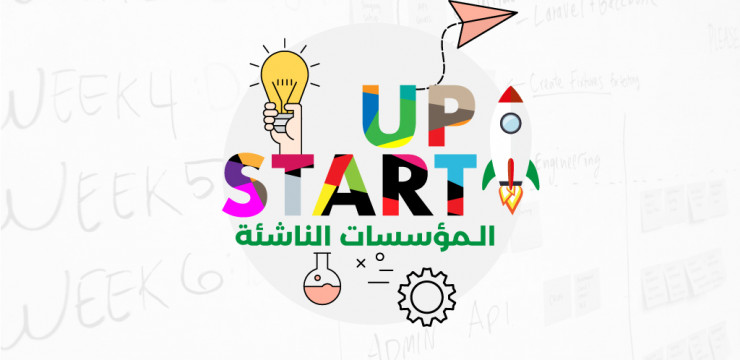
“National_Conference_of_Public_Scientific_and_Technological_Institutions“
Monday, December 23, 2024 saw the launch of the National Conference of Public Scientific and Technological Institutions by the Minister of Higher Education and Scientific Research, Professor Kamel BADDARI.This event is part of the promotion of scientific research as a strategic tool to achieve sustainable development, as the achievements made during the year 2024 were highlighted and the challenges facing the sector were discussed, in addition to anticipating future prospects to strengthen innovation and guide scientific research in the service of national priorities.
In his speech, the Minister of Higher Education and Scientific Research mentioned the qualitative leap observed in the financing of scientific research in Algeria, since the budget allocated to it has doubled with a significant increase expected in 2025. The Minister stressed that these investments reflect the State's commitment to building a knowledge-based economy and achieving sustainable development by supporting researchers and strengthening their role in developing innovative solutions to meet national challenges. He also emphasized the importance of strengthening cooperation between research centers and production sectors to transform research into practical applications that contribute to the development of the national economy.
For his part, the Director General of Scientific Research and Technological Development, Professor Mohamed Bouhicha, reviewed the significant achievements of the year 2024, where 1,376 patents were registered, 33 start-ups and 20 subsidiaries were created, in addition to the implementation of 349 research projects focused on vital areas such as food security, energy security and citizen health.
He also pointed out that the year 2024 saw the issuance of a number of executive decrees aimed at supporting scientific research and promoting innovation, including the launch of the "President of the Republic's Prize for Innovative Researchers", the establishment of specialized research centers such as the Center for Nanoscience and Nanotechnology and the Center for Applied Mathematics, in addition to the establishment of 50 incubators and 102 entrepreneurship development centers within universities, which contribute to promoting entrepreneurship among young people and developing the national economy.
The Conference was marked by a presentation of the achievements of a number of research centers, with Professor Ammar Manaa, Director of the Center for Research in Social and Cultural Anthropology, giving a presentation in which he discussed the center's achievements as part of Algeria's vision to strengthen scientific research and national development. He highlighted that 70 institutional research projects and 23 socio-economic impact projects have been launched, focusing on issues such as sustainable tourism and the impacts of the Covid-19 pandemic. He also reviewed the center's efforts to support innovation by establishing a subsidiary and an incubator to transform research into start-ups. International cooperation was mentioned through the implementation of 56 research projects with international institutions, in addition to publishing peer-reviewed scientific journals such as "Insaniyat" and "Tourath", which have obtained prestigious classifications. He concluded by mentioning the Center's Vision 2030, which includes 14 main research axes, strengthening its role as a major driver of sustainable development and scientific excellence. Professor Barnaoui Radia also made a presentation in which she highlighted the role of the National Institute for Educational Research in strengthening the education sector in Algeria, as the institute is considered a pivotal institution for supporting educational policies through scientific research. The presentation focused on the Institute's achievements, including the implementation of specialized research projects aimed at evaluating and improving the national education system and providing scientifically based recommendations to support decision-making.
Professor Barnaoui highlighted the Institute's contribution to updating school curricula to align them with international standards, in addition to organizing training courses for educators, which contributes to raising their professional skills. The institute's efforts in creating partnerships with universities and educational institutions to support applied research were also mentioned, in addition to publishing scientific studies and reports regarding the development of education.
✅The exhibition organized on the sidelines of the conference included the presentation of prototypes of innovative research projects.
✅The conference concluded with a debate session between the participants.
.png)
.png)
.png)
.png)







